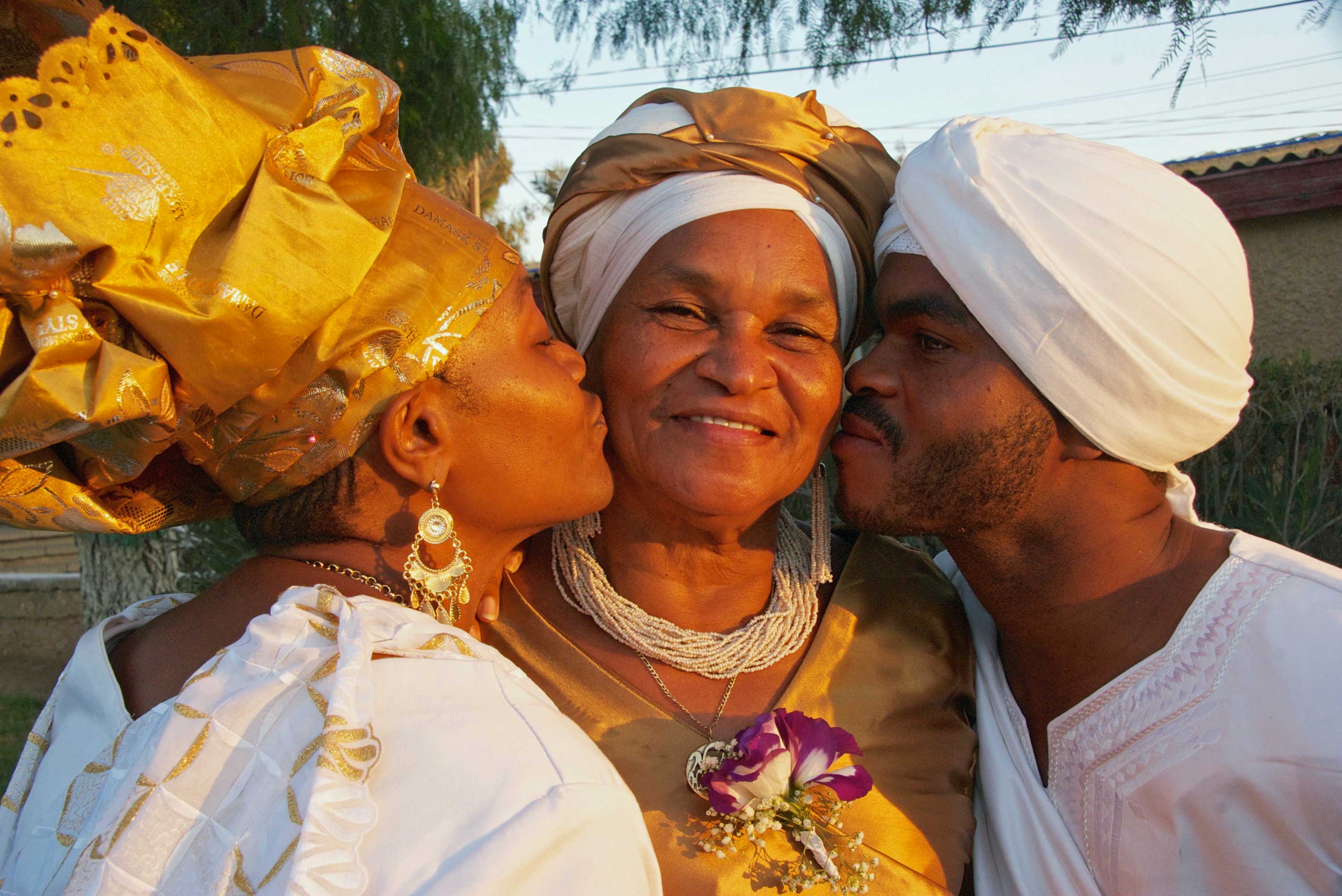On April 26 I received a short Facebook message from Zariyah, my spiritual brother in Dimona: “E Nekamah has passed on.” My heart sank. Emah Nekamah was the matriarch of the family I lived with for 14 months in 2007-2008 while conducting research on the African Hebrew Israelite community. She graciously welcomed me into her home and treated me like one of her own. She sewed clothes for me and taught me how to cook vegan soul food. She introduced me to the card game bid whist (and beat me more times than I care to remember). She continued to look after me when I lived in Tel Aviv, calling regularly and sending care packages.
She was my emah, I was her bain (pronounced with a slight Southern accent, as she hailed from Tennessee), we loved each other, and it was as simple as that.
At Zariyah’s wedding in September, Emah Nekamah looked regal in her sheen gold dress and gold-and-white headpiece. She had faced several health challenges over the years but did not allow her many aches and pains to prevent her from dancing with her son and daughter in law. She never wallowed in self-pity; her focus was always on the happiness and well-being of others. She truly embodied her Hebrew name (נחמה), serving as a source of strength for her family, friends, and community.
According to Zariyah, she collapsed at home on Saturday evening, April 25, as the sun was setting. She used to tell me how much she loved “the Shabbat” and the respite it offered from her numerous weekday obligations. “I don’t have to cook, I don’t have to clean, I don’t have to do nothing!” she would say. It’s comforting to know that she was able to enjoy one last peaceful Shabbat at home before making transition at the too-young age of 66.
As a tribute, I had wanted to share the details of Emah Nekamah’s extraordinary life, which she shared with me in a few formal interviews and dozens of conversations over the years. She was born in a rural suburb of Memphis, picked cotton as a girl, had three sons with her first husband but tragically lost them in a mysterious house fire, moved to Israel at age 23, got arrested and deported for overstaying her tourist visa, returned to Israel, distinguished herself as a hostess, seamstress, and adviser (she was among the first women to be elevated to aturah, or crowned sister), and raised more than 20 children, including those by her sister wives and those whose parents were out of the country on assignment.
In the days following her death I pieced together Emah Nekamah’s biography and sent a draft to members of her family in Israel. Many of them approved of the account and said they learned things about her they hadn’t known before. However, a few felt that the biography touched on too many sensitive personal and political topics. One family member was especially upset after the draft began circulating online without my knowledge, telling me he never wanted to speak to me again. I wrote the biography to celebrate Emah Nekamah’s life, not cause her family any more distress, so I’ve decided to hold off on publishing it. One day I hope to be able to share her full story.
[su_youtube url=”https://www.youtube.com/watch?v=DOf9d25J818″ width=”640″ height=”360″]The Day of the Show of Stength[/su_youtube]A video tribute prepared by Ben Halahliel Mercer.
***
I have many fond memories of Emah Nekamah, but the one I will treasure the most is the afternoon we spent together in Tel Aviv last spring. I had tried to get her to come up and visit me since 2010, but every time we made plans she had to cancel at the last minute. As an extra incentive, I gave her a gift certificate to a Tel Aviv nail salon for her birthday one year. Finally, a few weeks before I left Israel, she called me and said she was going to take a day off from cleaning houses in Sde Boker and catch the bus to TA. “It’s really happening?” I asked. “Yup,” she said with a laugh.
That day, she emerged from the Arlozorov station, we hugged, and I took her to see my apartment. She marveled at how much space I had, and I secretly felt guilty about how little space she had in the family’s cramped bungalow in Dimona. From there we proceeded to the nail salon on Ibn Gabirol Street. The Russian beauticians looked up from their manicure tables with wide eyes when we walked in the door together. I explained to the manager that my emah had a gift certificate for a manicure/pedicure to redeem. “Your emah?” the manager asked incredulously, turning to the woman who couldn’t possibly be my mother for an explanation. “Ken, that’s my bain,” she said sweetly. The beauticians found this hysterical, maybe a little weird.
Our relationship was unique and some might say improbable, given our vastly different backgrounds. It may have been incomprehensible to strangers. But it felt perfectly natural and real to me. I know it did to her, too.
The rest of the afternoon passed too quickly. We did some shopping in Gan Ha’ir, walked to the sea, drank fruit smoothies, talked and talked. Night fell, and I accompanied her back to Dimona on the train. I asked her if she enjoyed her visit. She said she did. I enjoyed it more.
***
May the memory of Emah Nekamah be a blessing.





Nice write up. Left me wanting to read more. She touched so many lives in so many positive ways. I am sure many have stories to tell ( including myself) about the positive influence she had on their lives. Indeed she was a true emah to many and lived always in a divine standard in which she encouraged others to follow. May her spirit live on forever through all she has touched. Love u always Emah Nekamah
Beloved Queen Mother Nacamah/ May her memory be Blessed —Until—–
She was a Mother to many grown folks as well! She was my 1st Mother when I arrived in Israel at the age of 18. I was legally grown but still in need of Mothering” and she gladly gave me love, comfort & taught me about the Community. I will always love & appreciate her as well as cherish the memories! RIP Emah Nekamah!
Emma Nekamah was a mother to us all and I fell a little guilty and bad that I never got to know her like I should have. I lived next door to Emma Nekamah all of my life and I would love to read that Biography one day . She will forever be in my heart and will always be loved.
What a BEAUTIFUL and TOUCHING & HEARTFELT tribute TO Emah Necahman.. Emah Necahmah was a very special and beautiful soul!! She will forever be with us..
Andrew, this is the beginning of a wonderful tribute to my Emah, Emah Nekamah. If you would like a more complete and comprehensive story of her life in Israel, which actually started in 1972 when she was sent to Israel to care for 3 teenagers (Ahvivah/16, Nogah/15 and Nathan/14) the children of Nahsee Ahmeshadye (we are now 58, 59, 60 years old). Our family would be more than happy to assist you in assuring that her story be told completely. Nogah, Nathan and I are her ‘Kingdom First Born’ children. Our humble beginnings together need not be omitted from her story. We together as a family set standards in the nation that helped to propel it to it’s next level of maturity. Emah came to Israel at age 24, raising a 16, 15 and 14 year olds that she had never met prior to her arrival. But she had great stock to work with. She raised us into our adulthood. I just wanted to give you a flavor of a significant period that you have missing from Emah’s life. You’ve only met the younger/later generation – You need to meet ‘The Brinson First Fruit’. We got the real story…
Todah rabah for reading, LaTina, and for offering to help me tell Emah Nekamah’s story. I will be in touch by e-mail.